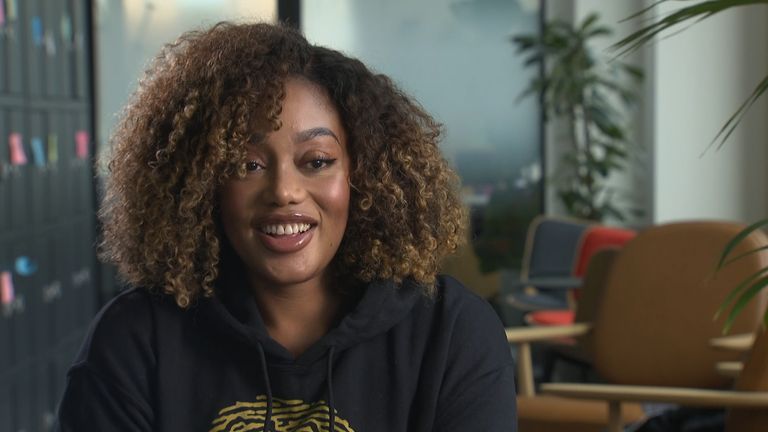Young black women are forced to be "stronger and more resilient than their years should require", a BAFTA-nominated director has told Sky News.
Sarah Gavron's film Rocks, which has been nominated seven times at tonight's BAFTAs, celebrates the friendship of a group of multicultural young girls from inner-city London, and is described as a "love letter" to such real-life women.
Gavron said it is "harder than ever for young people" at the moment growing up in a Britain which "in some ways feels broken," with "all the youth resources being stripped away".
She has made history as one of four women nominated for best director at this year's BAFTAs. Her film, and Chloe Zhao's Nomadland, lead the nominations with seven each, with Zhao also up for best director.
Gavron wanted to tell the story of people whose lives "you don't see represented on screen" - and Rocks is the result.
But as well as highlighting the hardships these girls endure she also wanted to show their complexities and the way they navigate their lives with "tenacity, resilience, with hope and with joy" - something the film manages beautifully.
Rocks was born out of extensive workshops Gavron and her team held in London schools to cast the girls, and to find the story they wanted to tell.
According to Gavron it was only made possible with the girls co-operation and collaboration.
First time screenwriter Theresa Ikoko, who is nominated for two BAFTAs, developed the storyline from her own experiences and then got the girls - including Bukky Bakray who plays Rocks, and is also nominated for best actress - to feed into it.
"I couldn't tell that story. I'm very far away from their worlds in many ways. So it felt like they had to work on it with us for it to feel authentic," said Gavron. "It could have been about any one of those girls."
The inclusive nature of the project is highly unusual, but Ikoko, for whom this was her first film didn't know anything different so was "frustrated" to learn it wasn't the norm.
"I didn't realise how fortunate I was. It should be easy for communities to be a part of telling their own stories... to work collaboratively and to share authorship.
"I don't know why it's presented as so difficult."
Rocks epitomises what BAFTA is trying to celebrate in terms of diversity and inclusion, with this year's nominations light years ahead of the ones in 2020.
Last year's awards proved extremely controversial when no non-white actors were nominated, forcing BAFTA to carry out an extensive review.
Subscribe to the Backstage podcast on Apple Podcasts, Google Podcasts, Spotify, Spreaker
This led to a raft of 120 changes being made to try to ensure more films are seen and more people from under-represented groups are involved in the decision-making.
The changes seem to have made a difference - four female directors are nominated this time, and 16 out of the 24 acting nominees are people of colour.
They are the most diverse set of nominations in BAFTA's history and crucially more nuanced stories from under-represented groups have been recognised, with horror His House and adventure Da Five Bloods veering away from stereotypical slavery or civil rights narratives.
However, according to Marcus Ryder, visiting professor of media diversity at Birmingham City University, there is still a very long way to go to improve diversity behind the camera, which is fundamentally important if there's going to be culture change.
Prof Ryder told Sky News the people we see on screen are the tip of the iceberg, "whereas the majority of the iceberg, the 80 or 90% of the iceberg that we really need to look at if you want to change the industry is incredibly non-diverse".
He says that means looking at the people who are greenlighting projects, those with editorial power, the directors, scriptwriters, all the way down to the runners, because these are the people who will actually shape what we see.
"If we really want to change the industry, we need to look far broader than just the scope of who may or may not have been nominated... if we don't, any progress we make is absolutely transitory".
Most cinemas have been closed for the last year, with filming schedules interrupted and releases delayed, which has had a hugely damaging effect on the sector as a whole.
However, one of the unintended consequences of the major studios delaying many of their releases has been to give smaller independent films more space to be seen.
So, the real test of whether BAFTA's changes have had any real effect will be when the arts world opens up and hopefully goes back to normal.
The BAFTA film ceremony will take place this evening at the Royal Albert Hall, and will be presented by Dermot O'Leary and Edith Bowman.





